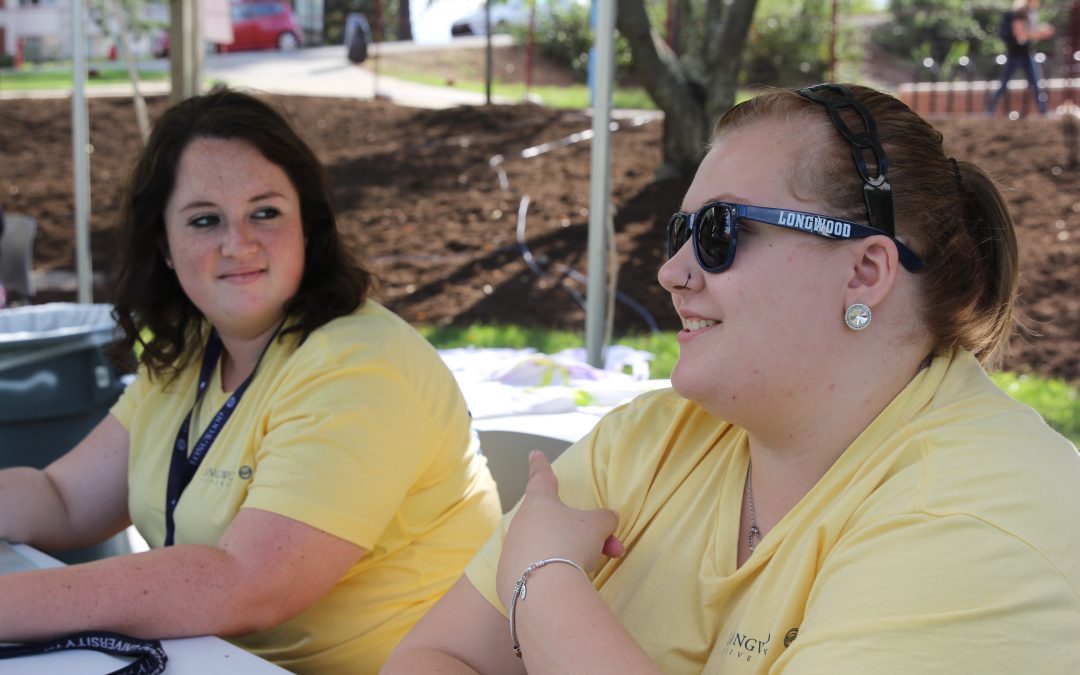FARMVILLE, Va. — Longwood University students were not required to be in class on Monday —they had an extended fall vacation. But many are on campus anyway, working long hours volunteering instead of sleeping in late on their break.
Why? Because Tuesday night, tens of millions of people will tune in to their school, located in Farmville, Virginia (population 8,216) when the vice presidential debate opens between Sen. Tim Kaine and Indiana Gov. Mike Pence, the running mates of Donald Trump and Hillary Clinton. The students too will be tuned in, hoping the candidates touch on issues they care about.
Kaine, D-Va., is a familiar face to most of them. He started his political career as a city councilman a little over 60 miles from where he will take the stage tonight. Longwood University students say his time as mayor of Richmond, governor of Virginia, and then senator may give him a home field advantage. His opponent has also been a governor and senator, though Trump running-mate Gov. Mike Pence hails from the Midwest.
Many of the students at Longwood University, a 5,000-student public liberal arts university, have been drawn back to school early to see if their candidates debate the issues most important to them. In light of the recent tuition increase at their university, Longwood students will be listening carefully to see if Pence and Kaine discuss the student loan crisis.
“I’ll probably come out of school with $30,000 in debt, and I never want my child to have to do that,” says Alexandra Moushegian, a junior studying public relations who hails from Salem, Virginia. “I’m hoping we’ll get a better system. Back when Bernie (Sanders) was around, he got me excited. I think he got every youngster excited in a way that Hillary and Donald haven’t.”
“I have family members who are still in debt from college at 50 years old,” says Tonisha Pitchford a senior from Richmond, studying communications. “I don’t want that to be me.”
The students often cited generational divides over issues they expect to come up in the debate.
Mikayli Ballhaus, a sophomore liberal studies major from Fredericksburg, Virginia, says her generation is especially turned off by statements they perceive as anti-Muslim or anti-black.
“It puts a lot of hate out that a lot of the younger generation doesn’t understand,” Ballhaus says. “I guess that’s how [Trump] was raised or how he sees things, but with my age group, we’re very inclusive with everybody.”
Moushegian added that she thinks current social justice movements feel new to millennials, while older generations may think the same issues have already been solved.
“Because people in older generations saw the civil rights movement, some of them think it’s over and aren’t taking this seriously,” Moushegian says. “They thought they dealt with it. With our generation, this is the first time we’re going through this experience.”
Compared to older generations, millennials are less interested in politics and may vote at lower rates. Malina Foldesi, the leader of Longwood’s College Republicans, agrees, arguing that young people’s lack of engagement in politics hurts her generation.
But the 2016 election campaign may have sparked a revival in civic engagement among young people, with nearly three quarters of voters under 30 saying they have given a lot of thought to the election–15 percent higher than in 2012.The Longwood students on campus for debate week instead of taking advantage of their fall vacation, argue that their generation cares deeply about politics–just perhaps in a different way than the baby boomers.
“I can get out what I have to say with the press of a button,” Pitchford says. “In the past it was harder to share opinions on political issues, but now we can speak up so easily. People say young people aren’t interested in politics, but we’re the ones sharing our opinions online. Everyone I know was on Twitter during the first debate, we’ll all be there for this one too.”
Taylor Hogg, a senior, argued that because this is the first election where she will cast a ballot, she feels a “sense of pride” in exercising her right to vote. Others say that because they are on the cusp of adulthood, the desire to vote is also motivated by a desire to shape the world they will soon enter.
“This election will affect me when I’m going into the working world as an adult,” Moushegian says. “I think that’s why I’ve been paying more attention.”
While the young voters of Longwood University may not share the same opinions on all of the issues they care about, many of them share a desire to play their own part in this election, no matter how small.
“This is something I’m going to look back on in 50 years and tell my grandkids about,” Bell says. “It’s cool to be a part of history.”
This story was originally published by PRI.


